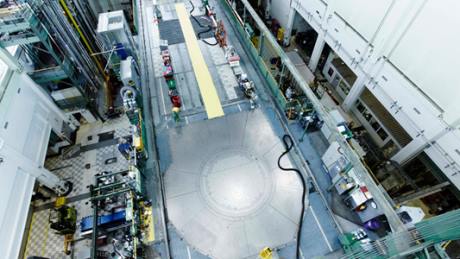Canada's National Research Universal (NRU) - one of the largest and most versatile research reactors in the world - has been permanently shut down. The reactor at the Chalk River site ceased production in October 2016, but had since remained on standby.
 |
| NRU (Image: CNL) |
Operator Canadian Nuclear Laboratories (CNL) announced yesterday that the reactor had been "quietly shut down for the last time" at 7.00pm on 31 March. The reactor will now be placed into a "state of storage" prior to decommissioning.
NRU began operations in 1957. In 2000, the Canadian government announced that the reactor would cease routine production of molybdenum-99 (Mo-99) in 31 October 2016. However, in February 2015 the government announced its decision to support an extension of the reactor's operations until October 2016. Since then, NRU has remained on standby "in case of a significant shortage which could not be mitigated by other means", AECL said.
Chalk River operating licence
The Canadian Nuclear Safety Commission has approved CNL's application to renew the operating licence for its Chalk River nuclear campus. The new licence is valid until the end of March 2028.
"This is exceptional news for the future of Canadian Nuclear Laboratories, the hard-working professionals who work at out Chalk River campus, and more broadly for our local communities here in the Ottawa Valley and the nuclear industry in Canada," said CNL President and CEO Mark Lesinski.
"Our application was based on a track record of solid safety and environmental performance; this new licence reflects both our current efforts and our future plans to create a stronger, more resilient and enduring national laboratory with a revitalised talent pool, facilities and infrastructure," he added.
The reactor produced about 40% of world supply of Mo-99 - the precursor of technetium-99m (Tc-99m), the most widely used isotope in nuclear medicine. Research reactors in Australia, Europe, Russia and South Africa have since met demand.
NRU was built not only to supply radioisotopes but also as a major neutron physics research facility and to provide engineering research and development support for Canada's nuclear power program. The reactor operated at power levels up to 135 MWt and had an annual capacity factor of around 80%.
Since announcing in 2000 that it would cease Mo-99 production at NRU, the Canadian government has promoted a strategy to develop alternative sources of supply for the vital medical radioisotope in which it has invested some CAD60 million. A project to build two 10 MWth MAPLE research reactors at Chalk River, which would have been able to replace most of the radioisotope production from NRU, was abandoned in 2008.
In a joint statement, CNL President and CEO Mark Lesinski and AECL President and CEO Richard Sexton said: "The contributions to science and humanity made by this reactor and the team within are immeasurable. Canada provided lifesaving medical isotopes to the benefit of over a billion people; we built and supported the continued operation of a nuclear fleet that has provided clean, reliable energy to Canada and the world; we have supported research that has led to Nobel prizes, grown our understanding of the world we live in, and enabled technological and industrial advances that we enjoy each and every day. In short, NRU and the team have made the world a better place."
Researched and written
by World Nuclear News














